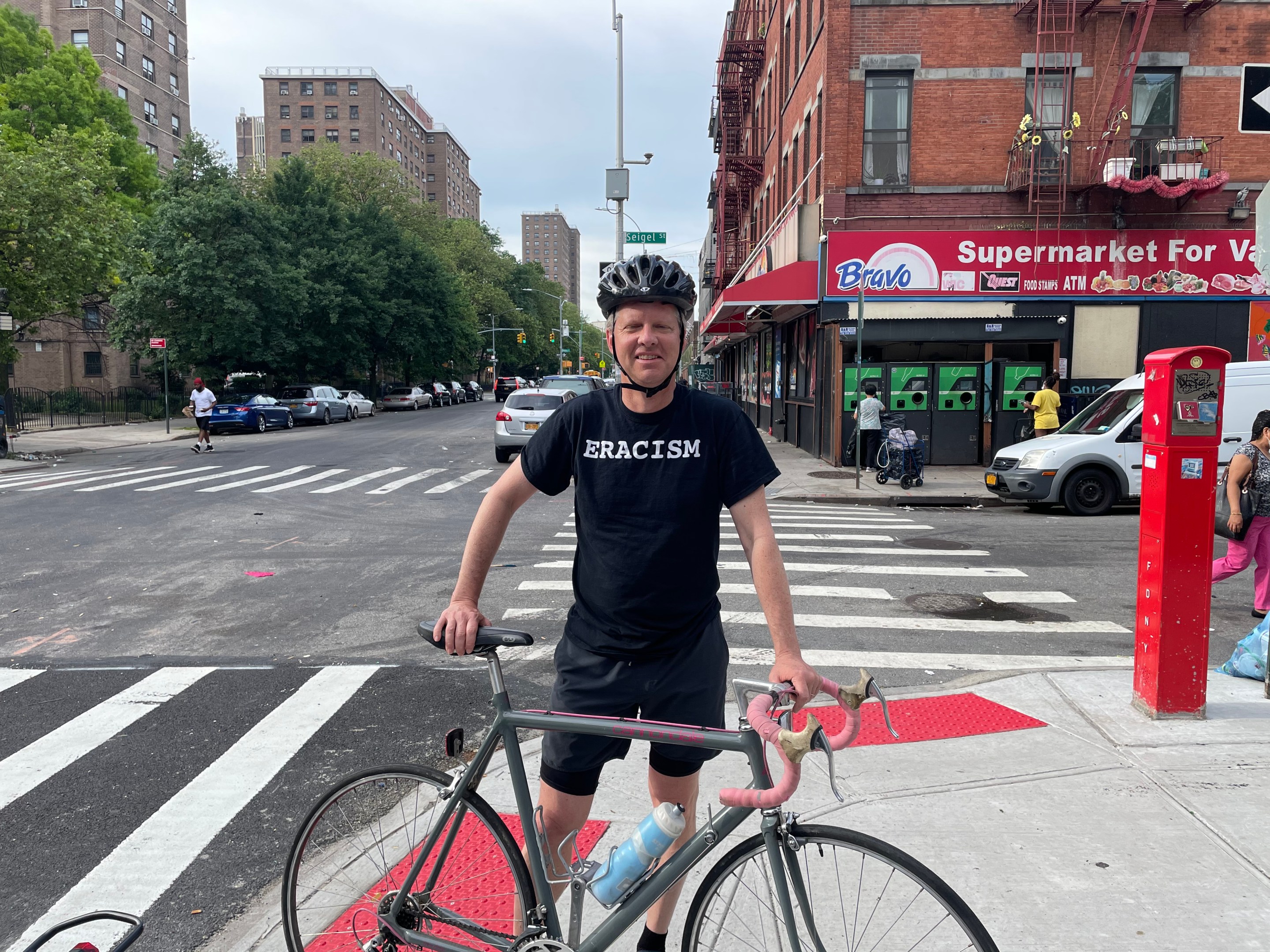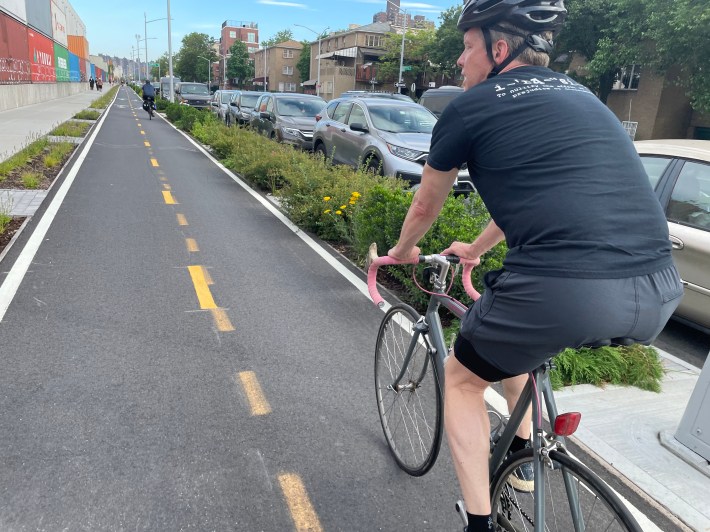This is the fourth in a series of bike rides that ace reporter Dave Colon is having with mayoral candidates (prior chapters included rides with Council Member Carlos Menchaca, Art Chang and Kathryn Garcia). Mayoral candidates interested in taking the “Dave Colon Challenge” should email dcolon@streetsblog.org, but you are running out of time Andrew Yang, Eric Adams, Scott Stringer, Dianne Morales, Maya Wiley, and Ray McGuire.
Shaun Donovan, former Bloomberg Housing Commissioner and Obama Housing Secretary, is staring out at the corner of Nassau Avenue and McGuiness Boulevard, the site of a recent still-unsolved fatal hit-and-run.
"I don't see a single measure on the streets that encourages people to slow down," he says. "We have to redesign our streets for safety. Obviously bikes are important to me, but people have to come first. So between traffic calming measures, automated enforcement, there's just so much more than we could be doing to make sure that we're we're saving people's lives. We cannot be the best city in the world with streets from the past century. Every time we repave a street, every time we plan, every decision we make on our streets has to contribute to bringing them into the 21st century.
As Donovan is considering the traffic sewer, a father and his daughter, who's pushing herself on a scooter, cross the five lanes devoted entirely to moving cars.
"We have to put people first," Donovan says. "See the guy walking his daughter? They don’t come first."
Breaking silos
Donovan has spent his government career in housing, but he has a lifetime of city cycling under his belt (he used to bike between his divorced parents' houses as a child). Together with his urban planning background, he has an interest in looking deeply at solutions for better streets.
"Just think about if every time you put one dollar into replacing sewer infrastructure, into new road funding, into broadband, into anything where you're opening up streets and sidewalks, if you have a coordinated plan, that's really based on a 21st-century Complete Streets model, every one of those dollars is an innovation dollar. That's the way it happens if you bring agencies together, which has been, I think, one of the single greatest failings of the de Blasio administration — the inability to really bring agencies together," he said.
Donovan suggested that a comprehensive view of the street and of planning will be urgent for the next mayor, given the possibility that an infrastructure package of some kind could come out of Washington and possibly shoot a firehose of federal fun money at New York City. In practice, efforts to manage that money for pedestrian and cyclist-friendly infrastructure would flow through an Office of the Public Realm, which Donovan pitched as a kind of catch-all agency to take care of streets and public space in a way that breaks agencies like the Department of Transportation or Parks Department or the Department of Design and Construction out of their usual silos.
"That's what I mean, by really thinking things through to be interconnected," Donovan said when asked how a street as car-dominated as Flushing Avenue can somehow become a main connection to a waterfront greenway. "It's almost like you plan these things out in silos, so the Parks Department doesn't talk to the to DOT. But if you really have an interconnected, coordinated plan, then you start to create routes that people flock to."
It's of course a well-worn trope for elected officials and candidates to say that they'll bring agencies together to work better (aka knock heads together to ensure the people's business is done effectively). Voters can't get enough of candidates who vow to make government "functional." Donovan, like Kathryn Garcia, sharpened his tools in the guts of government. He said that for him, it's more than a talking point.
"When I started as Housing Secretary, we had a huge veteran homelessness problem. The agencies were fighting about 'Who was actually homeless?' The Department of Education, Veterans Administration, we all had different definitions. So we created an interagency council and actually figured out how to create a single data system that tracks everybody across the populations. We started something called HUDStat, which got every one of those agencies together on a single plan and we said here's what we're gonna do. And then the president held everybody accountable for that," he said.
21st Century Street Safety Boy
What is a 21st-Century Street to Donovan? Some of moving into the 21st century is about reclaiming old rail lines from the 19th century and turning them into bike superhighways. But superhighways only get you so many places, so other parts of the equation is thinking through how to make room for people using e-scooters, e-bikes, mopeds and other micromobility that moves faster than a bike without the two tons of a steel of a car.
"At the individual street level, there's a real chance to think about better protection and how we get to the next level on open streets. You have to really begin to have a standard design for streets that put bike lanes behind barriers and also create wider lanes. One of the problems now is you've got us [on bikes] and you've got 30 mile-per-hour micro mobility modes that are really almost a different animal. So since the standard three foot lane is just not enough in most places, I think you've got to claim a lane in a lot of places," said Donovan.
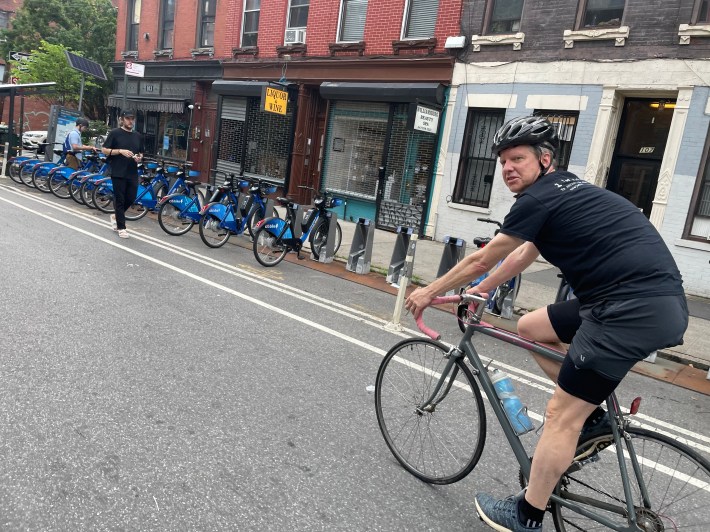
Where the city does have an open streets and open restaurants program these days, the road to get there was bumpy and never really included a comprehensive bike network. As Donovan sees it, New York has actually fallen behind other cities when it comes to the concept of complete streets. Sounding a note similar to Mayor de Blasio's own surface transportation council, Donovan said that the city missed its moment to make sweeping and beneficial changes to the city's streets when traffic was down.
"One of the things I have learned again and again in public service is that you don't always know when your moment of opportunity is going to be, but you have to be planning all the time to be ready. So if we had a real comprehensive plan to start transforming the streets between open streets, open restaurants, a coordinated cycling plan, this would have been the time to do it. And if you look at other cities around the country and around the world, that's what they've started to do, like Anne Hidalgo in Paris and others that have really started to make change during this moment," he said.
But, Donovan also said the next chance at that kind of change could come at any time.
"I think we missed that moment. But I think there's always a moment of opportunity in the beginning of an administration to do big things. And people really want a change in direction. What I've found is that in crisis, folks are open to doing big things. It would have been a hell of a lot better to start a year and a half ago. But I think there's always a moment of opportunity with new leadership."
An organizer at heart
Despite Donovan's talk of government planning, he has a soft spot for bottom-up organizing, as one might expect from a former city official whose unexpectedly friendly relationship with housing activist and organizing group ACORN earned him a second-place endorsement from the organization's former leader Bertha Lewis. Donovan suggests the city can get through the hard politics of new streets by inviting New Yorkers into what he thinks can be a better planning process.
"The city has to work with local communities, not just when there's a rezoning, but doing real community based planning. Planners and architects can bring 3D visualization tools, they can bring all kinds of things that allow neighborhood residents to start to see things differently," said Donovan.
Donovan has argued that the city can and should expand the open streets program into under-resourced neighborhoods, but the way to get there most effectively is to sit people down and ask them what they want out of their open streets.
"It's not just taking people to visit an open street and saying, 'Isn't this nice?' It's also tell me what you're looking for. Are you looking for more green space, for a farmer's market, for the ability to walk with your kids? And to actually see the way that your streets could change in real time is something we can do now that we could never do 20-30 years ago, that other cities have started doing but this city hasn't really done. That's we what we did with Rebuild by Design. After Hurricane Sandy, we brought together the best designers planners, and sat them down with communities to say let's reimagine what this neighborhood could look like," said Donovan.
Will the bottom-up organizing mean the potential for endless delays? Sounding more like Carlos Menchaca's idea of Organizing 101 than you might expect from a former Bloomberg official, Donovan suggested that getting people on board with certain beneficial changes will at least blunt their opposition to other ones, and that government can organize people out of their silos just like it can do the same to departments.
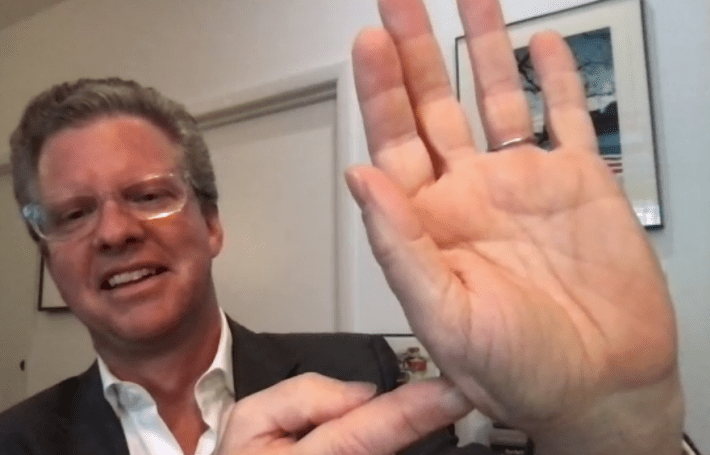
"Bringing the streets in 21st century, that's an opportunity to sort of build a consensus for, 'OK, we're going to losing parking spots [but] at least we're getting innovations like resident parking and other things that make it easier to get that consensus. Too often we think as 'transportation advocates,' or we think as 'open space advocates,' 'parks,' 'disability,' 'senior' advocates, rather than building broader coalitions. I think there's a hidden set of grassroots groups that if we effectively organized, and we had leadership around that, I think we could build a broader coalition. Especially in this moment," he said.
And of course, there's Donovan's own personal experiences with the city's streets. The man who once got doored badly enough to wind up needing metal pins in his hand, has put in the years on streets that haven't been made for cycling.
Going across town on Flushing Avenue, he said he thought it's possible to turn even that traffic sewer into a safer path for people to get from Bushwick and points east to the Kent Avenue waterfront and downtown Brooklyn, but that it would take a mayor who's skilled at navigating the politics around street redesign. (Which mayor? Him, he would tell you)
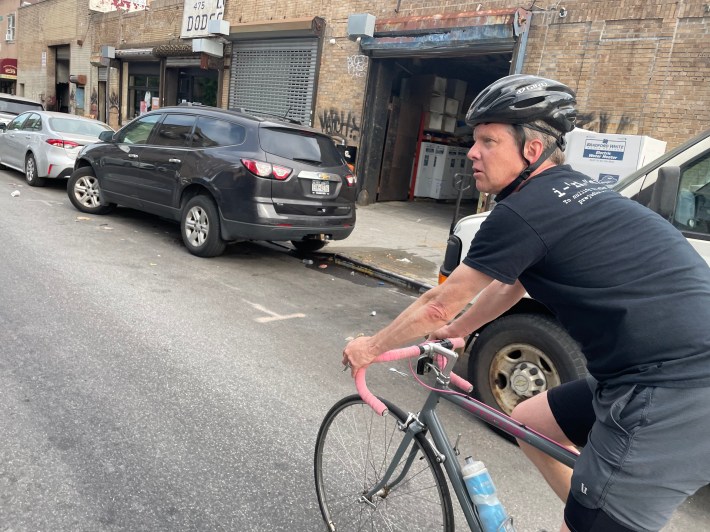
"The politics of these are always tough. If we're going to really solve that, you have to use streets in smarter ways in lots of different senses. One of the things cities are experimenting with and is really interesting to me is, can you use sensor technology to track street sweepers and garbage trucks? So if and when you reduce parking, you use it more efficiently and in ways that people can actually find parking spots once they know when the street sweeper is past and can get to the limited number of parking spots. We could build a more of a consensus for change that would be powerful," he said.
Beyond getting maimed on the road, Donovan raised kids using his bike, which will quickly clarify the need for safe streets for children and parents both.
"It was pure terror all the way to the park," he said about riding with one of his sons on a child seat on the back of his bike. Talking about his experience teaching his kids to ride for themselves, Donovan again brought up the "t" word.
"I'll never forget, my boys, who are 22 and 19 now, we started them out on those running bikes when they were young. And the terror of them going full speed up a crosswalk, you know you're going, 'Oh no, stop.' We could have used open streets back then," he said.
The election is on June 22. Early voting began on June 12. Click here for more information.
